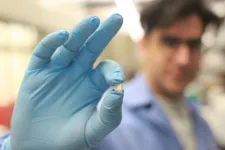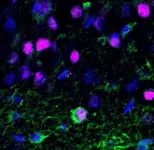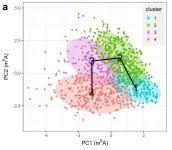The Chan Zuckerberg Biohub Chicago’s milestone achievement tracks protein levels in real time, enabling monitoring of inflammation at the cellular level
Proteins are the building blocks of life, and changes in protein levels can indicate improving health or impending illness, including signs of inflammation. While protein levels can be measured in periodic blood or urine tests, it has been an uphill challenge to figure out how to continuously monitor protein levels in the human body in real time.
Now, a team of bioengineers at Chan Zuckerberg Biohub Chicago, supported by the Chan Zuckerberg Initiative, and Northwestern University present a major milestone in that effort: sensors implanted under the skin that track protein changes in living animals as those changes occur. In proof-of-concept tests, described December 5, 2024 in Science, the novel technology accurately and sensitively measured protein biomarkers of inflammation in diabetic rats.
The work is a significant step toward a deeper understanding of inflammation, one of the most complex and important phenomena in the human body. An estimated 50% of all deaths are attributed to inflammation-related diseases, including cancer and heart disease. The new technology lays the foundation for future tools to monitor, track, and someday even prevent inflammation in individuals. Such ability could radically change the treatment of inflammation-related illnesses, similar to how continuous glucose monitors revolutionized the treatment of diabetes by improving patient outcomes and lowering overall healthcare costs.
“This is a completely new capability – to be able to watch inflammation in real time,” said senior author Shana Kelley, president of CZ Biohub Chicago and professor of chemistry and bioengineering at Northwestern University. “We hope one day this technology will benefit many people and provide a means to prevent advanced disease.”
Shake it off
When CZ Biohub Chicago launched in 2023, the team set a goal of embedding bioelectronic sensors into tissues to monitor inflammation. To do that, the team first needed a way to measure levels of protein cytokines, chemical messengers produced by the immune system that bind to cells to induce inflammation.
But there was a problem. While numerous sensors exist to continuously detect small molecules, such as glucose or electrolytes, sensors for proteins – which are larger and more complex than small molecules – have proven to be more challenging. To detect proteins in biological fluids, scientists rely on molecules or proteins that strongly attach to proteins to pull them out of fluid. That Velcro-like attachment, however, is so strong that the receptors hold on for more than 20 hours, making it impossible to measure real-time fluctuations in protein levels.
“We recognized this fundamental obstacle, and developed the idea that maybe we can shake the proteins right off of the sensors,” said Kelley. “And the first time we tried it, it worked beautifully.”
The team developed nanoscale sensors that look like rows of bulbous pendulums, each consisting of a cord of DNA with a larger piece of DNA on the end to bind a desired protein. Those sticky pendulums “catch” target proteins, then shake back and forth to fling those proteins off and catch others within a minute.
Next, the team engineered an implantable microdevice with the sensors embedded inside a thin microneedle, the width of three human hairs, similar to microneedles inside continuous glucose monitors used by people with diabetes to track blood glucose. The scientists implanted the device into the skin of rats with diabetes. Diabetes and inflammation are tightly linked, with many of the complications of diabetes caused by inflammation.
The sensors successfully measured concentration changes of two cytokine proteins, markers of inflammation, in the fluid just under the skin of the rats. When the rats fasted and blood glucose levels were under control, the sensors detected the levels of the cytokines drifting down. Conversely, when the rats were injected with a substance that agitates the immune system, the sensors recorded inflammatory cytokine levels rapidly shooting up.
‘The sky’s the limit’
Currently, Kelley and the Chan Zuckerberg Biohub Chicago team are using the sensors to study inflammation in rats under diverse conditions, and incorporating the sensors into a variety of tissue models of inflammation. By embedding tissues with thousands of sensors and sampling probes, the Biohub’s collaborative team of scientists, engineers, technologists, and physicians are working toward monitoring the activity of immune cells in real time, aiming to find ways to steer the immune system away from the “tipping points” that lead to inflammatory disorders.
The ultimate goal is to find a way to use this technology for human health tracking. If researchers can more deeply understand and monitor inflammation in the human body in real-time, they may be able to intervene, and even prevent, inflammation-related diseases in the future, dramatically transforming healthcare and saving lives.
“Like continuous glucose monitoring opened up the ability to monitor patients with diabetes in real time, this has the same potential to allow us to monitor, and even prevent, many diseases,” says Kelley. “With inflammation, the sky's the limit with what you could do for your health by keeping a handle on it.”
The work represents a significant step forward in CZ Biohub Chicago’s mission to build technology to make precise, molecular-level measurements of biological processes within human tissues. These initial results are a direct result of the CZ Biohub Network’s collaborative model for scientific research. CZ Biohub Chicago is one of four institutes in the Chan Zuckerberg Biohub Network.
###
About the Chan Zuckerberg Biohub Chicago
CZ Biohub Chicago, part of the Chan Zuckerberg Biohub Network, is a nonprofit biomedical research center founded in 2023. CZ Biohub Chicago’s researchers, engineers, and data scientists, in collaboration with colleagues at partner universities — Northwestern University, the University of Chicago, and the University of Illinois Urbana-Champaign — are engineering novel technology platforms to understand inflammation and the immune system. Learn more at czbiohub.org/chi.
About the Chan Zuckerberg Biohub Network
The Chan Zuckerberg Biohub Network is a group of nonprofit research institutes that bring together scientists, engineers, and physicians with the goal of pursuing grand scientific challenges on 10- to 15-year time horizons. These institutes partner with Chan Zuckerberg Science in its goal to understand the mysteries of the cell and how cells interact within systems. This collaboration will bring us closer to our mission to cure, prevent, or manage all disease by the end of the century. To learn more, visit www.czbiohub.org.
END





